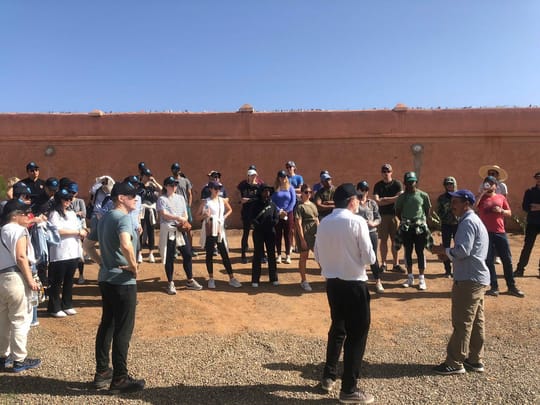Students See Grassroots Development in Action at Akrich Nursery

On March 16, 2023, the High Atlas Foundation hosted students from the UVA Darden School of Business on a day trip to visit the Akrich Nursery in Al Haouz province outside of Marrakech. As a remote intern with HAF based in Rabat, I had the opportunity to attend this trip alongside the students and see the work of HAF in person for the first time. The Akrich Nursery was established in 2014 as the first of several fruit tree nurseries HAF has built on land adjacent to Moroccan Jewish cemeteries as part of its House of Life program. During our visit to Akrich, we learned about the history of Akrich nursery, its current operations, and the intersection of sustainable agriculture, cultural preservation, and human development.
We began the day at the fruit tree nursery, where we heard from caretaker Abderrahim Beddah, whose family has been looking after the Jewish cemetery and its land for three generations. We also saw the carob and pomegranate saplings currently growing in the nursery and heard from HAF President Yossef Ben-Meir about the challenges and opportunities that these tree varieties present to the families who receive them from a financial perspective. Yossef then took us into the room housing the 700 year-old tomb of Rabbi Raphael Hacohen, where we continued the discussion on the connections between cultural preservation, environmental sustainability and human development, and how HAF works at the center of this intersection. Before departing the nursery facilities, we stopped by the community event space that houses a yearly celebration of Jewish pilgrims to the Rabbi’s tomb, among other interfaith community events.
We then walked to the site of the Achbarou Cooperative, which is close to the nursery. This women’s cooperative was established after a series of HAF empowerment workshops, and the members specialize in the traditional craft of carpet weaving. Students had an opportunity to hear more about the women’s work and their experience forming a cooperative before sitting down for a communal lunch prepared by the cooperative members. After lunch, students expressed their appreciation for the women sharing their experiences with them, and the women in turn thanked students for their attention and care during the visit.
I greatly enjoyed the opportunity to attend this trip and see the tangible results of HAF’s work in the Al Haouz province. It was interesting to see how HAF works at the intersection of agricultural development, women’s empowerment, and cultural preservation through its fruit tree nursery program, and how the combination of these different concepts furthers holistic human development. It was also interesting to see that HAF programs do not work in silos; rather, each component of their work—from the distribution of fruit trees to local farmers to the creation of a community event space—complement and sustain each other to have a long-lasting positive impact on the community. Additionally, hearing directly from women of the Achbarou cooperative was a powerful way to witness the impact that HAF has had on individual lives in the region. All in all, the visit demonstrated to me the capacity of local communities to drive human development, not just in Morocco but in the world as a whole.